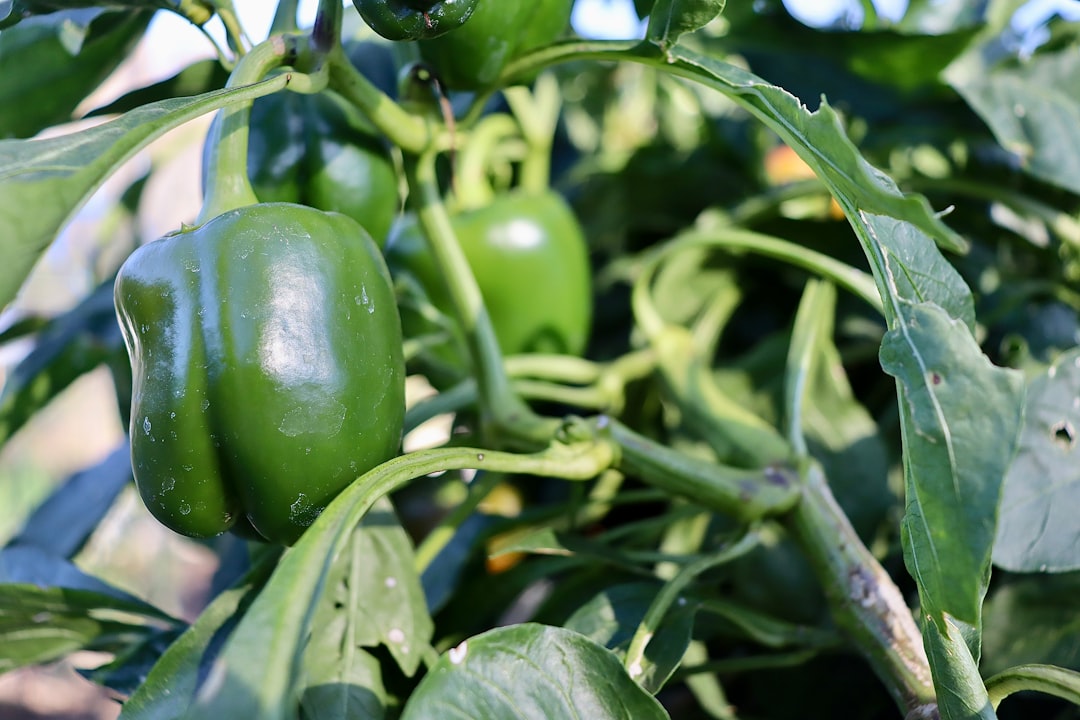Green peppers, also known as bell peppers, are a vibrant and versatile addition to many culinary dishes. Their crisp texture and slightly bitter flavor make them a popular choice in salads, stir-fries, and as a topping for pizzas. You may find them in various colors, including red, yellow, and orange, but green peppers are harvested before they fully ripen, which is why they have a distinct taste and nutritional profile.
As you explore the world of green peppers, you will discover not only their culinary uses but also their nutritional benefits and potential health risks. Incorporating green peppers into your diet can be an enjoyable way to enhance your meals while reaping the rewards of their health-promoting properties. Whether you enjoy them raw, grilled, or roasted, these peppers can add a burst of flavor and color to your plate.
However, it is essential to be aware of both the benefits and potential drawbacks associated with consuming green peppers. This article will delve into the nutritional benefits of green peppers, the possible health risks they may pose, and how to enjoy them safely.
Key Takeaways
- Green peppers are a popular vegetable known for their mild flavor and crunchy texture.
- Green peppers are low in calories and high in vitamins A and C, making them a nutritious addition to any diet.
- While green peppers are generally safe to consume, they may pose potential health risks due to pesticide residue and allergic reactions in some individuals.
- Green peppers belong to the nightshade family and contain high levels of solanine, which may cause digestive issues and impact blood pressure in sensitive individuals.
- To minimize potential health risks, it is recommended to wash green peppers thoroughly, buy organic when possible, and be mindful of any allergic reactions or digestive issues after consumption.
Nutritional Benefits of Green Peppers
Green peppers are a powerhouse of nutrition, packed with vitamins and minerals that can contribute to your overall health. One of the most notable benefits is their high vitamin C content. Just one medium-sized green pepper can provide you with more than 100% of your daily recommended intake of this essential vitamin.
Vitamin C is crucial for maintaining a healthy immune system, promoting collagen production for skin health, and acting as a powerful antioxidant that helps combat free radicals in your body. In addition to vitamin C, green peppers are rich in other essential nutrients such as vitamin A, vitamin K, and several B vitamins. Vitamin A is vital for maintaining good vision and supporting immune function, while vitamin K plays a key role in blood clotting and bone health.
The presence of B vitamins, including B6 and folate, contributes to energy metabolism and supports brain health. Furthermore, green peppers are low in calories and high in dietary fiber, making them an excellent choice for those looking to maintain a healthy weight or improve digestive health.
Potential Health Risks Associated with Green Peppers

While green peppers offer numerous health benefits, it is important to recognize that they may also pose certain health risks for some individuals. Understanding these potential risks can help you make informed decisions about your diet. One of the primary concerns is the possibility of pesticide residue on conventionally grown green peppers.
Pesticides are often used in agriculture to protect crops from pests and diseases, but they can leave harmful residues on the produce you consume. Another potential risk is related to allergic reactions. Some individuals may experience adverse reactions after consuming green peppers due to food allergies or sensitivities.
Symptoms can range from mild discomfort to severe reactions, making it crucial for you to be aware of your body’s responses when trying new foods. Additionally, digestive issues may arise for some people when consuming green peppers, particularly if they have underlying gastrointestinal conditions.
Pesticide Residue
| Food Product | Pesticide Residue (ppm) |
|---|---|
| Apples | 0.42 |
| Strawberries | 0.55 |
| Spinach | 0.43 |
| Grapes | 0.35 |
Pesticide residue is a significant concern for many consumers when it comes to fruits and vegetables, including green peppers. The Environmental Working Group (EWG) regularly publishes a list of produce items known as the “Dirty Dozen,” which highlights fruits and vegetables that tend to have higher pesticide residues. Green peppers often appear on this list, indicating that they may contain harmful chemicals even after washing.
To minimize your exposure to pesticide residues, consider purchasing organic green peppers whenever possible. Organic farming practices typically use fewer synthetic pesticides and fertilizers, resulting in cleaner produce. If organic options are not available or feasible for you, thoroughly washing your green peppers under running water can help remove some surface residues.
Peeling the skin can also reduce exposure, although this may result in the loss of some nutrients found in the skin.
Allergic Reactions
Allergic reactions to green peppers are relatively uncommon but can occur in sensitive individuals. If you have a known allergy to other members of the nightshade family—such as tomatoes or eggplants—you may also be at risk for an allergic reaction to green peppers. Symptoms can vary widely and may include itching or swelling of the mouth and throat, hives, gastrointestinal distress, or even anaphylaxis in severe cases.
If you suspect that you may be allergic to green peppers or experience any adverse reactions after consuming them, it is essential to consult with a healthcare professional for proper evaluation and guidance.
Digestive Issues

For some individuals, consuming green peppers can lead to digestive discomfort. This is particularly true for those with irritable bowel syndrome (IBS) or other gastrointestinal conditions. Green peppers contain certain compounds that may be difficult for some people to digest, leading to symptoms such as bloating, gas, or abdominal pain.
If you find that green peppers consistently cause digestive issues for you, it may be worth considering alternative vegetables that are easier on your digestive system. Cooking green peppers can also help break down some of the fibrous components, making them easier to digest compared to raw consumption. Experimenting with different cooking methods may allow you to enjoy their flavor without experiencing discomfort.
Nightshade Sensitivity
Green peppers belong to the nightshade family of plants, which includes tomatoes, potatoes, and eggplants. While nightshades are nutritious for many people, some individuals may experience sensitivity or intolerance to these foods. Symptoms can include joint pain, inflammation, or digestive issues.
If you suspect that nightshades may be affecting your health negatively, it might be beneficial to eliminate them from your diet temporarily and observe any changes in your symptoms. If you do decide to eliminate nightshades from your diet due to sensitivity concerns, it’s essential to ensure that you are still getting a balanced intake of nutrients from other sources. Consider incorporating a variety of colorful vegetables into your meals to replace the nutrients typically obtained from nightshades.
High Levels of Solanine
Solanine is a naturally occurring compound found in some nightshade plants, including green peppers. While solanine levels in green peppers are generally low compared to other nightshades like potatoes or tomatoes, excessive consumption or improper storage can lead to higher concentrations of this compound. Ingesting large amounts of solanine can result in symptoms such as nausea, vomiting, diarrhea, and even neurological effects in severe cases.
To minimize the risk of solanine exposure from green peppers, ensure that you store them properly in a cool and dry place. Avoid consuming any green parts of potatoes or sprouted potatoes as they contain higher levels of solanine compared to other parts of the plant. If you notice any unusual bitterness in your green peppers or if they appear damaged or spoiled, it’s best to discard them.
Impact on Blood Pressure
While green peppers are generally considered heart-healthy due to their low sodium content and high levels of potassium, some individuals may need to monitor their intake more closely if they have specific health conditions related to blood pressure. Potassium is known for its ability to help regulate blood pressure by counteracting the effects of sodium in the body; however, excessive consumption of potassium-rich foods can be problematic for those with kidney issues. If you have been diagnosed with hypertension or any kidney-related conditions, it’s essential to consult with your healthcare provider regarding your dietary choices.
They can provide personalized recommendations based on your individual health needs and help you determine how many servings of potassium-rich foods like green peppers are appropriate for you.
Potential for Contamination
Like all fresh produce, green peppers can be susceptible to contamination from bacteria such as Salmonella or E. coli during handling or processing. To reduce the risk of foodborne illness associated with consuming raw green peppers, it’s crucial to practice proper food safety measures.
Always wash your hands before handling food and rinse your produce thoroughly under running water before consumption. If you’re preparing dishes that include raw green peppers—such as salads—ensure that all utensils and cutting boards are clean and sanitized. Cooking green peppers can also help eliminate potential pathogens if you’re concerned about contamination.
Conclusion and Recommendations
In conclusion, green peppers are a nutritious addition to your diet that offers numerous health benefits while also posing certain risks for some individuals. By understanding both the advantages and potential drawbacks associated with consuming these vibrant vegetables, you can make informed choices about how best to incorporate them into your meals.
If you have known allergies or sensitivities related to nightshades or experience digestive issues after consuming green peppers, it may be wise to consult with a healthcare professional for personalized advice. Ultimately, moderation is key when it comes to enjoying any food—green peppers included. By being mindful of your body’s responses and making informed choices about your diet, you can savor the delicious flavor and nutritional benefits that green peppers have to offer while keeping potential risks at bay.
While green peppers are often celebrated for their nutritional benefits, some individuals may experience digestive discomfort or allergic reactions when consuming them. This can be attributed to the presence of certain compounds that are harder to digest or that trigger sensitivities in some people. For a deeper understanding of how certain foods, including green peppers, can impact your health, you might find this related article insightful. It explores various dietary considerations and how they can affect overall well-being, particularly in senior health.
Over 60? Ditch THIS Sneaky Veggie Wrecking Digestion, Bloating, and Microbiome Balance.
FAQs
What are the nutritional benefits of green peppers?
Green peppers are a good source of vitamins A, C, and K, as well as folate and potassium. They also contain fiber and antioxidants.
Why are green peppers considered bad for you?
Green peppers are not inherently “bad” for you, but some people may experience digestive issues or allergic reactions to the compounds found in green peppers.
Can green peppers cause digestive issues?
Yes, green peppers contain compounds called lectins and solanine, which can cause digestive issues such as bloating, gas, and stomach discomfort in some individuals.
Are there any health risks associated with consuming green peppers?
For most people, green peppers are safe to consume. However, individuals with nightshade allergies or sensitivities may experience adverse reactions to green peppers.
How can I minimize the potential negative effects of green peppers?
If you experience digestive issues or allergic reactions to green peppers, you can try cooking them thoroughly, removing the seeds and skin, or opting for other types of peppers such as red or yellow peppers.
Are there any alternatives to green peppers with similar nutritional benefits?
Yes, red and yellow peppers have similar nutritional profiles to green peppers and may be better tolerated by individuals who experience issues with green peppers. Other alternatives include broccoli, kale, and Brussels sprouts, which also provide similar vitamins and minerals.
